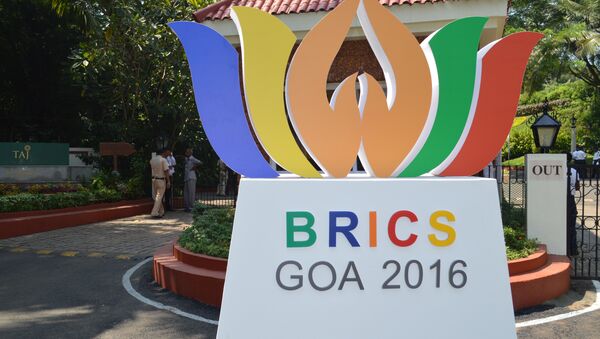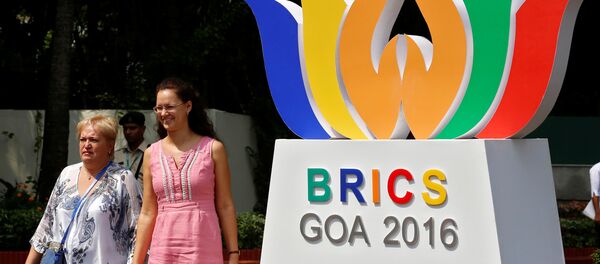The five-coloured lotus designed by the Mumbai-based calligraphy artist Sundeep Gandhi was picked from about a hundred other versions. According to the organizers the design symbolizes India’s national flower in the middle, folded into a “Namaste” gesture, surrounded by other petals that represent Russia, Brazil, China and South Africa.
Modi’s critics in Congress were quick on the draw, criticizing the Prime Minister for picking a symbol that is also a logo of India’s influential BJP party. Others didn’t like that the design was lacking the word “Goa”, while all other summit logos contained the name of the place where the meetings were held.
Congress sees BJP's election symbol in BRICS logo. Why have lotus there? pic.twitter.com/NM3HvNISET
— Manak Gupta (@manakgupta) 14 октября 2016 г.
The organizers responded to their critics by picking a location with actual live lotuses for one of BRICS meetings. Sunday’s BRICS-BIMSTEC bilateral talks were held in Goa’s Leela hotel, which is known for its beautiful lotus pond. Leaders of The Bay Of Bengal Initiative for Multi-Sectoral Technical and Economic Cooperation member states - Bangladesh, India, Myanmar, Thailand, Bhutan, Nepal and Sri Lanka, had a half-hour conversation with BRICS officials. BIMSTEC’s mission is to increase cooperation among South Asian and South East Asian countries.
Besides international politics, BRICS summits are the go-to place for big business projects. On Saturday Russia and India signed 18 agreements, including contracts on arms and energy cooperation. On the same day, the BRICS business council came up with a set of recommendations to members, including the initiative to form a new rating agency for emerging economies.
BRICS Business Council Chairman Onkar Kanwar told Sputnik that the whole concept of Russia, India, China, South Africa and Brazil coming together was truly visionary:
"I am sure that economic shocks and economic cycles are transitional and you have to look at all this over a longer period of time. BRICS nations put together provide a significant part of economic growth across the globe and it is a very relevant block, even with current challenges. I am sure that expanding cooperation, for example, deepening trade will be an important part of BRICS agenda in the foreseeable future."
On Sunday BRICS leaders adopted the Goa declaration, emphasizing the importance of strengthening solidarity and cooperation based on the organization’s common interests.
Despite the recent problems that each member state was facing internally and on the international level, it seems that BRICS countries are willing to stand by their principles, showing that with initiatives like the organization's own New Development Bank, and the proposed rating agency for emerging economies, together they can protect their interests and work effectively towards common goals.




